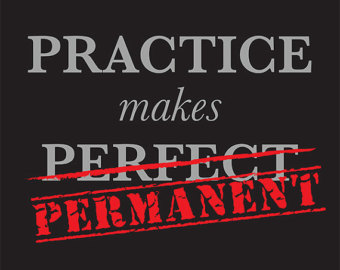Practice makes permanent, not perfect. How and what you practice determines what is made permanent.
The saying should be, “Perfect practice makes perfect” though I prefer the word “Optimal”. Perfection is a neurotic goal whereas Optimal is possible within the limits of strengths, weaknesses, values, goals and purpose.
Fine, so how does one practice optimally? One of life’s ironies is that we’re least able to practice optimally when first starting to learn. And, what’s practiced first has a dramatic impact; good or bad.
The Perfect Swing
A golf swing is among the most complex and elegant feats the human body can perform. Having rarely picked up a club I read “Search for the Perfect Swing” before learning to play golf. The book taught me what a perfect golf swing looked like from many vantage points. The more I read the more I wanted to play. So, after reading the book I took a few lessons and, with the help of a pro, bridging the gap between mind and body was a joy!
Playing golf is now fun, not torture. A lot of this has to do with getting off to an Optimal start:
- I was interested, but, detached from the urgency of having to “Get started right away”.
- The book “spoke my language” covering the subject from many angles and vantage points.
- The lessons were efficient because concepts and language were understood. The instructor was freed up to show how to physically swing the club rather than explain language, lingo or why he was leading me in certain directions.
- I had no qualms about looking bad, seeking help or taking instruction from a pro.
- Distinctions between what felt natural and what were optimal techniques were made from the start. The danger here is that what feels natural is mistaken for optimal instead of just easy. As I learned from playing the guitar what comes natural or “easy” is only one component of what is truly optimal technique.
While better golfers struggle to remove bad habits from their swing, without messing up the whole, I have the luxury of building on an optimal foundation. The few times I get to play are truly enjoyable.
Preparation vs. “Just Do It”
People say, “Don’t think about it, just do it!” as if offering brilliant insight. In fact, advising action without thought is terrible advice, especially, if you don’t know what you’re doing.
A three second delay before “Just speaking” saves a world of hurt. The same goes for thought before action. A little thought before “Just doing it” saves time and may save the effort of undoing, redoing or repairing what wasn’t done right the first time.
Let’s say you’re moving to a new house and loading all your possessions into a truck. While others are mapping out the space you just grab things and start loading them. No need to get “bogged down in the details”, you say, “Just cut to the chase and start loading!” You’re brilliant . . . .until you run out of space or start breaking things. Now you have to unload the truck, map out the space, reload the truck and repair/replace the broken items. Gee, I guess “Anything worth doing is worth doing twice”!
Imagine the same mistake in learning how to play golf. How hard (Or impossible) will it be to unlearn and remove bad habits from muscle and bone because you didn’t waste time learning the fundamentals and just jumped right in and got started!
Diligence vs. Insanity
If practice makes perfect then diligence leads only to perfection. But, diligence, alone, could just as well lead to insanity. If what you’re practicing is flawed, or mechanically wrong, diligence could halt, reverse or permanently degrade performance and make expertise impossible.
Diligence is an admirable quality after you’re clear on the fundamentals of what you’re being diligent about.
Optimal Feels Unnatural, at First
When learning a new skill there’s a tendency to mistake what feels natural with what’s optimal. What feels natural, at first, is usually just what’s easy. And what comes easy is rarely optimal in terms of long term technique. Learning to play the guitar is a good example.
When you pick up a guitar and hold it “Naturally” neither the left or right hands fall into the optimal positions. In fact, when shown how to place the hands, correctly, the first thing people say or think is “This hurts!” It not only feels unnatural, it hurts. Nobody would put their hands in the correct guitar positions “Naturally”. And yet, as painful as the optimal playing position is, at first, it’s the only way to avoid long term damage to your hands and master the instrument. Get it wrong at the beginning and you’ll pay, pay, pay every time you play.
Going by what we “Feel” is usually an excuse to do what’s easy. And what comes easy is only optimal after gaining expertise. What’s easy, at first, may be a disaster in the long term.
Self-Taught is No Badge of Honor
What’s so great about being Self-Taught? Tiger Woods is a natural born golfer and he isn’t self-taught. So, what’s the brag about?
Being self-taught is ok for things around the house or supporting skills incidental to your work. For important skills, however, it’s no badge of honor unless:
- You don’t care enough about the activity to put effort or time into it.
- You don’t want to spend money on training.
- It’s not a long term interest for you.
- It’s not important enough to make a fuss about.
There’s nothing wrong with any of this if the skill is trivial. For important skills, however, throw the badge of self-taught in the trash. All it takes, nowadays, is watching a DVD, reading a book or watching videos on the web to get started on the right foot.
The Benefits May be Indirect
Slowing down to prepare or practice the right habits into muscle and bone could pay huge dividends. Ironically, the dividends may go into different skill than the one you’re learning. That’s because doing one thing well has a lot in common with doing anything well. The optimal characteristics, behaviors, look, feel and approach to optimizing one thing parlays into everything you do.
In a previous article about expert marksmanship I ask:
“What profession or task would not benefit from the discipline and precision required to become a Rifleman?
- What about adjusting your sights is not transferable to adjusting a miter saw?
- What about establishing your NPOA is not transferable to target marketing?
- What about zeroing a rifle is not transferable to Optimizing workflow?
- What about the shooting by the numbers is not transferable to visualizing your goals?”
then suggest . . .
“For those who haven’t yet settled on a profession precision rifle training exercises a myriad of mental and physical ‘muscles’ that can be applied to future pursuits, yet unknown.”
A Modern Jumpstart
Having so much information at our fingertips is a big help when it comes to learning new skills. Before engaging in serious practice why not:
- Do a web search to find experts who communicate well about their expertise.
- Watch Youtube videos of experts.
- Order and watch Training DVDs.
- Checkout Lynda.com for a huge library of software training.
- Find books written by experts who speak simply and teach well.
We often hear adults remark that “Kids today know so much more than I did at their age”. That’s probably true. But, they have to. There’s two billion more people on the planet than when I was a kid. When learning skills to contribute and compete it’s more important than ever to practice foundational skills correctly, from the start.
Personal Examples – Good and Bad
Here’s some personal examples of skills and activities I practiced well from the beginning and some that I didn’t.
Good
- Golf – The book Search For The Perfect Swing: The Proven Scientific Approach To Fundamentaly Improving Your Game
came along at the perfect time and seemed to have been written just for me. It saved me from frustrations that would have made me give up the game. Instead, I enjoy getting a little better each time I play. That’s all I care about with golf because it’s the people, outdoors and elegance of the game that I enjoy.
- Flying – I found a natural born pilot passionate about the art and craft of flying. He was not shy about being hard on me, when needed. Also, unlike many flying students I stuck with the same instructor for most of the hours required to earn the general pilots license. That’s important because getting familiar with multiple teaching ‘styles’ is an obstacle to most flying students. Another part of optimizing flying practice from the start was the wealth of DVD training videos on every aspect of flying. Not spending money on them would have been very expensive.
- Guitar – My parents found the best teachers right off the bat for me. I still marvel at the awkward habits ingrained into many guitar players who weren’t as lucky.
- Piano – Already an accomplished guitar player, choosing a good piano teacher came naturally.
- Handgun Shooting – Another example of the optimal grip feeling anything but natural, at first. Through books, DVDs, youtube videos and a friend who is a Federal law enforcement trainer the stance and grip that now feels natural was put into place with Optimal instruction.
Bad
- Motorcycling – Early dirt bike riding was a good start because I crashed more often and learned from each one. However, street bike riding is a zero crash high risk scenario. I commuted by motorcycle for seven years, but, had no idea what I didn’t know until being clued in by a friend. Better late than never, I suppose. The book “Proficient Motorcycling” would have been perfect to read before any street bike riding.
- Weight Lifting – Everybody thinks they know what they’re doing and almost nobody really does. My early weightlifting was fraught with bad form, working out too many days a week, too many repetitions and no idea how to recover other than eating lots of chicken and eggs and sleeping all day. Ridiculous and nothing but bumping into obstacles and moving backwards.
- Rifle Shooting – My dad was great in getting us out into the woods to shoot and being safe about it. He also taught us good trigger technique. However, my brother and I were clueless when it came to holding the rifle, using a sling to stabilize, lining up the sights or learning about anything but our pellet guns and his .22LR. I’m not complaining because he probably taught us more than most dads. However, I wish there had been something like the Appleseed Project back then.
Elegance is Worth The Effort
As you progress into mastery the conscious mind no longer has to focus on fundamentals if they’re practiced well from the beginning. The mind is freed up to focus on overall performance. Sometimes it’s the elegant details and sometimes its the context of the performance. These could turn out to be the most beautiful or critical aspects of your performance. Both are worth the effort of optimizing from the start.




